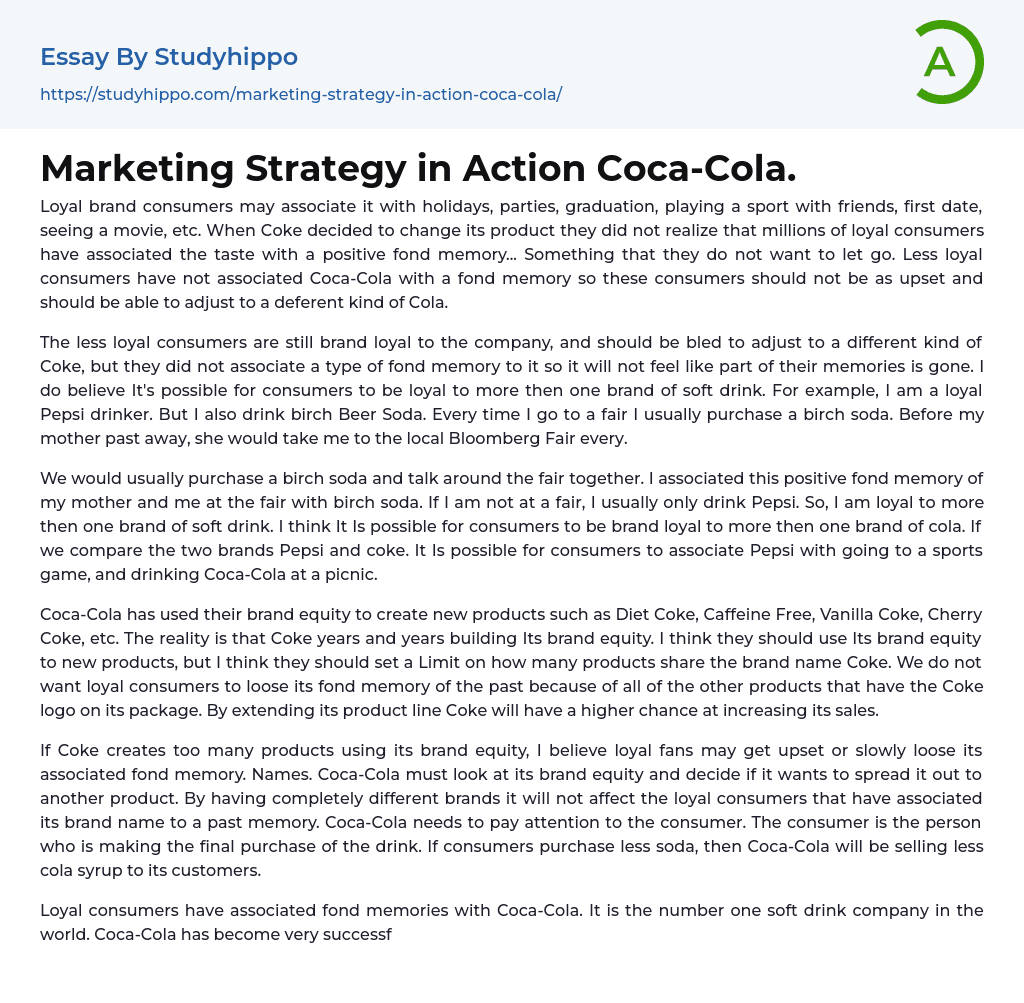Coca-Cola is linked to positive memories for loyal brand consumers, such as holidays, parties, graduation, playing sports with friends, first dates and seeing movies. However, these loyal consumers who have formed a strong attachment to the taste due to these memories are unwilling to let go of the product. On the other hand, less loyal consumers who have not associated Coca-Cola with any specific memory should not be as upset and should be able to adapt to a different type of Cola.
Even though less loyal consumers still show loyalty towards the Coca-Cola brand since they haven't associated it with any specific memory, a change in the product would not feel like a loss for them. It's also possible for consumers to be loyal to multiple soft drink brands. For instance, I am devoted to drinking Peps
...i but I also enjoy birch beer soda when I attend fairs. Birch soda holds a positive memory of going to the local Bloomberg Fair with my late mother and enjoying a birch soda together. Nevertheless, outside fair settings, I usually stick to drinking Pepsi. Henceforth, I am faithful to more than one brand of soft drink. This demonstrates that consumers can be brand loyal even when comparing Pepsi and Coke; associating Pepsi with sports games and Coca-Cola with picnics.
Coca-Cola has utilized its brand equity to introduce various products like Diet Coke, Caffeine Free, Vanilla Coke, Cherry Coke, etc. However, it is crucial for Coca-Cola to set a limit on the number of products that share the brand name in order to preserve the fond memories of loyal consumers. By expanding its product line within this limit, Coca-Cola ca
increase its sales opportunity. Creating too many products could upset loyal fans and dilute their nostalgia. Coca-Cola should consider alternative branding options to avoid impacting the loyal consumers who have a strong association with its brand name.
Ultimately, Coca-Cola needs to focus on consumer preferences, as they are the ones making the final purchase decisions. If soda consumption decreases, Coca-Cola will sell less cola syrup to its customers. Loyal consumers have cherished memories with Coca-Cola as it holds the position of the world's leading soft drink company.
Coca-Cola's success lies in its ability to borrow brand equity through initiatives such as sponsoring the 1996 Summer Olympics. By doing so, they aim to create an association in consumers' minds between Coca-Cola and the event, ultimately influencing their purchasing decisions. The advantage of borrowing brand equity is cost-effectiveness and forming positive memories that would impact future buying choices.Despite the possibility of some consumers not linking Coca-Cola with the Olympics and therefore wasting money on these individuals, developing brand equity can foster consumer loyalty. If customers can associate positive experiences with a brand, it can result in lifelong devotion. To further strengthen its brand equity, Coca-Cola has implemented new labeling and packaging for its existing products. Although this proactive approach may risk disconnecting loyal consumers from their cherished memories due to changes in product appearance, it also has the potential to motivate those who haven't purchased a coke recently to do so. In addition, Coca-Cola has globally introduced the Contour bottle as a means to enhance its brand equity through this distinctive packaging design. With its highly successful marketing team, The Coca-Cola Company has positioned its bottle as one of
the most recognized bottles worldwide.
- Wal-Mart essays
- Discover essays
- Competition essays
- Effective Leadership essays
- Leadership Styles essays
- Public relations essays
- Planning essays
- Mission Statement essays
- Outsourcing essays
- Swot Analysis essays
- Business Analysis essays
- Business Plan essays
- Strategic Management essays
- Strategic Planning essays
- Reasoning essays
- Community Development essays
- Negotiation essays
- Advertisement essays
- Advertising essays
- Anheuser-busch essays
- Audience Theory essays
- Brand essays
- Brands essays
- Competitor Analysis essays
- Consumer essays
- Detergent essays
- Marketing Management essays
- Marketing Mix essays
- Marketing Plan essays
- Marketing Research essays
- Marketing Strategy essays
- New Product Development essays
- Point Of Sale essays
- Price essays
- Procurement essays
- Product essays
- Product Differentiation essays
- Product Placement essays
- Promotion essays
- Promotion And Marketing Communications essays
- Research Design essays
- Retailing essays
- Trademark essays
- Adidas essays
- Amazon essays
- Apple essays
- Bmw essays
- British Airways essays
- Burger King essays
- Coca-Cola essays




